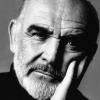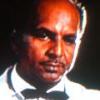On the subject of understatement, Newman says:
"I guess one of the things that concerns me and interests me about music for film is why is music there in the first place? And if it is there, why is it saying something? And I guess the obvious reason is because sometimes a scene can be emotionally blank and therefore needs filling in. At the same time there's such nuance, particularly in modern movies, of actor's performance that I just never want to to clobber that."
"As a composer, you think you have to write something because there you writing it. Here you are at your studio and here's a moment in the film. 'Well gee, I've got to write something her' as opposed to saying , 'Well gee, what if I leave it alone, and I don't do anything, and put a 4 beat pause in the music? So that rather than turning the corner in a compositional sense you're allowing the visual to turn a corner, or the dramatic thing to turn a corner, and you're catching it on the other side. I think you learn that the older you get."
"I want to assume that I'm not there to tell the audience what's happening so much as underline and deepen an experience, often by subtext as opposed to parallel comment."
From the 2nd edition of
On the Track: A Guide to Contemporary Film Scoring by Fred Karlin and Rayburn Wright.
That's what I like about Arnold's work. Bond music, at it best, was never subtle. It almost competes with the imagery for attention. There's nothing better than the scores for Goldfinger and On Her Majesty's Secret Service, IMO.
Listen to Teasing the Korean (minus the Mickey Mousing at the end) and The Laser from GF or Over And Out and Bond Settles In from OHMSS, and you'll hear restrained, light, sparsely orchestrated, and understated music scoring the subtext of their respective scenes.








